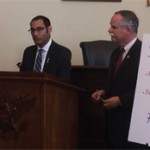Life After the SGR
Could this be the year we finally eliminate the broken Medicare Sustainable Growth Rate (SGR) formula? Years of persistent work by volunteer ACR advocates, working in tandem with physicians from other societies, may finally pay off in 2013. However, we must keep going together until we cross the finish line.
Since it was put in place by Congress in 2002, the SGR payment formula has brought rheumatologists and other physicians to the edge of a steep payment cliff year after year. The cuts called for by the SGR formula have grown over the years, increasing to the point that rheumatologists and other physicians face a 26.5% cut in reimbursements on January 1, 2014, if nothing is done. Congress has continually stepped in, often at the very last minute, to save the day and prevent massive cuts and devastation to patient access. The result has been not only an annual (or more frequent) payment crisis for rheumatology practices, but also years of flat funding, despite the ever-rising costs of practicing medicine and uncertainty about the future.
Through years of dedicated work, rheumatologists and their counterparts in other specialties and subspecialties have succeeded not only in having Congress nearly universally recognize the SGR as a flawed system that must go, but also in driving the conversation about what will eventually replace the SGR.
The ACR and its volunteer leaders have met—and continue to meet—with members of Congress and their staff many times over the past year, conveying recommendations about how to replace the SGR. These discussions included the following suggestions:
- Permanently repeal the SGR;
- Guarantee at least five years of stable, positive payment updates while new systems and measures are tested;
- Maintain fee-for-service as an option for physicians;
- Make available a variety of payment models for the diverse spectrum of rheumatologists;
- Call on specialty societies like the ACR to develop measures pertaining to their subspecialty or related disease types; and
- Recognize rheumatologists and other cognitive specialists with appropriate reimbursement for their services, expertise, and additional training.
In response, key committees in the House of Representatives (Energy and Commerce, Ways and Means) and the Senate (Finance) crafted bipartisan legislation incorporating many of the objectives the ACR asked them to include. While no plans are perfect, the final result is an unprecedented opportunity for Congress to pass legislation that finally repeals the SGR, establishes in its place a period of stable, positive payment updates, and eventually incorporates incentives for quality into the fee-for-service payment system.
